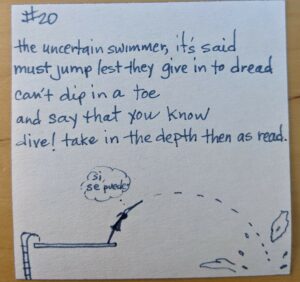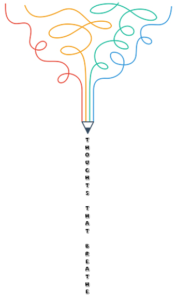Somewhere, college-aged me is face-palming in dismay.
My junior year we were required to read Alexander Pope’s An Essay on Criticism. To say that it was a slog is an understatement; I could not STAND his know-it-all tone and his insistence that all the great minds had to make their way through the Greeks and other classical writers, and that good poets must write in a prescribed way – prescribed by him, of course. Add to that, it was written in verse so there was this overarching sense of self-superiority AND rhymed couplets. Gah! Imagine my disgust to learn that he was, at the time of his publication, all of twenty-three — nearly the same age as I was — and yet he pontificated as if he knew EVERYTHING.
Granted, he knew more than I did, but STILL.
Despite how annoying Pope was, we get tons of witty sayings from him — “To err is human, to forgive, divine,” and “Fools rush in where angels fear to tread” among the most notable. His declaiming today’s proverb wasn’t really original, writing, as he did, during the Age of Enlightenment where the publication of works became more commonly accessible. Suddenly anyone – gasp! – who could read had access to learned discourse, not just those who had been classically educated at the best schools. On that more level playing field, English politician/philosopher Sir Francis Bacon published a 1601 essay on atheism. In it he argued, “A little philosophy inclineth man’s mind to atheism; but depth in philosophy bringeth men’s minds about to religion.” That train of thought is a cousin of our proverb:
“A little learning is a dangerous thing;”
drink deep, or taste not the Pierian spring:
there shallow draughts intoxicate the brain,
and drinking largely sobers us again.
– Alexander Pope, An Essay on Criticism, 1711

the risk
the uncertain swimmer, it’s said
must jump, lest they give in to dread.
can’t dip in a toe
and say that you know
dive! perceive the depth then as read
Is a little learning is a dangerous thing? Perhaps, although maybe knowing even a little can alert you to the vast seas of ignorance in which you’ve previously been content to swim. At least one can hope so.

Tanita, I’ve been catching poems on social media and should have been coming blog to blog because LOOK what I’ve been missing!! Not just these poems but also drawings?? And your usual brilliant contextualizing narration. Gosh, I love this. I’m loving all of these….
I’m attracted to your bold “jump” and “dive,” though as a prior jumper myself I think we are in extremely sensitive-times in terms of what one says and perhaps testing the waters first for a bit might help to calm the rapids…
Thanks for this thought-provoking post, and I love your diver sketch!
As a former lifeguard, I’m going to have to disagree with this one. If you use a swimming metaphor, you should definitely know the depth BEFORE you dive. Better to wade in resolutely, no matter how chilling the water (or facts), and resolve to keep wading until the bottom drops off and you can swim.
On this I totally agree: my little bit of knowledge about the climate crisis has indeed alerted me to my own (and others’) vast seas of ignorance.